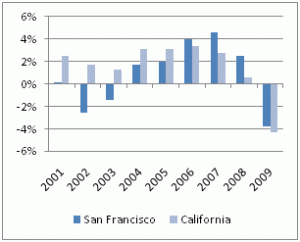
In February 2007, San Francisco implemented the nation’s first paid sick days law, allowing all workers within the city to earn a minimum amount of paid sick leave.
Restaurants are among the employers least likely to provide sick leave benefits, absent such a requirement. Therefore, if minimum paid leave standards effect the number of jobs available, we would expect to see that impact most clearly in the food service industry.
The data show that the job market in restaurants and bars has been stronger in San Francisco than in the state of California as a whole in every year since the sick days law passed.
Restaurants operate on small profit margins, leading some to believe they would be unable to absorb the costs of paid sick days. But restaurants compete primarily with other establishments within the jurisdiction that must meet the same standards – ensuring a level playing field. Additionally, restaurants are especially likely to profit from a healthier workplace, happier employees, and customers who want to return.
The evidence from San Francisco suggests that, on balance, restaurant employment remains strong when employers are required to make the shift to paid sick days.
Read more | Paid Sick Days and Restaurant Jobs: The Evidence from San Francisco
Via Washington Policy Watch